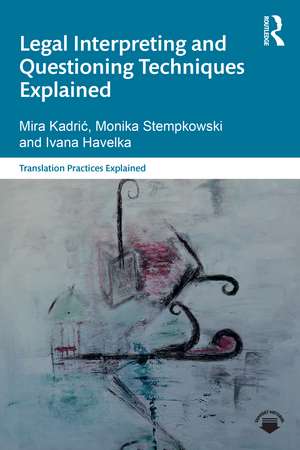Legal Interpreting and Questioning Techniques Explained: Translation Practices Explained
Autor Mira Kadrić, Monika Stempkowski, Ivana Havelkaen Limba Engleză Paperback – 31 mai 2024
This book also addresses the increasing use of technology and hybrid forms of translation and interpreting in the legal system, and shows different ways in which interpreters co-construct information. Chapters include summaries of key concepts and definitions, examples from existing literature combined with practical experience and the results of surveys conducted by the authors, as well as further reading and non-language-specific study activities. Activities include role plays on thematic scenarios involving different actors in criminal proceedings and discussion groups to enable reflection on ethical issues and discursive challenges.
This is a vital text for both advanced students and professionals in interpreting studies and criminology.
| Toate formatele și edițiile | Preț | Express |
|---|---|---|
| Paperback (1) | 303.89 lei 3-5 săpt. | +22.67 lei 7-13 zile |
| Taylor & Francis – 31 mai 2024 | 303.89 lei 3-5 săpt. | +22.67 lei 7-13 zile |
| Hardback (1) | 1000.27 lei 6-8 săpt. | |
| Taylor & Francis – 31 mai 2024 | 1000.27 lei 6-8 săpt. |
Din seria Translation Practices Explained
-
 Preț: 302.17 lei
Preț: 302.17 lei -
 Preț: 265.72 lei
Preț: 265.72 lei -
 Preț: 233.92 lei
Preț: 233.92 lei -
 Preț: 280.81 lei
Preț: 280.81 lei -
 Preț: 287.68 lei
Preț: 287.68 lei -
 Preț: 309.50 lei
Preț: 309.50 lei -
 Preț: 228.76 lei
Preț: 228.76 lei -
 Preț: 289.62 lei
Preț: 289.62 lei -
 Preț: 346.96 lei
Preț: 346.96 lei - 18%
 Preț: 1058.65 lei
Preț: 1058.65 lei -
 Preț: 287.05 lei
Preț: 287.05 lei -
 Preț: 259.40 lei
Preț: 259.40 lei -
 Preț: 349.91 lei
Preț: 349.91 lei - 17%
 Preț: 271.43 lei
Preț: 271.43 lei -
 Preț: 279.69 lei
Preț: 279.69 lei -
 Preț: 465.91 lei
Preț: 465.91 lei - 5%
 Preț: 323.59 lei
Preț: 323.59 lei -
 Preț: 290.37 lei
Preț: 290.37 lei -
 Preț: 410.50 lei
Preț: 410.50 lei -
 Preț: 380.36 lei
Preț: 380.36 lei -
 Preț: 362.82 lei
Preț: 362.82 lei - 17%
 Preț: 246.74 lei
Preț: 246.74 lei - 17%
 Preț: 246.96 lei
Preț: 246.96 lei - 22%
 Preț: 371.87 lei
Preț: 371.87 lei -
 Preț: 443.69 lei
Preț: 443.69 lei - 13%
 Preț: 321.08 lei
Preț: 321.08 lei -
 Preț: 367.23 lei
Preț: 367.23 lei -
 Preț: 395.85 lei
Preț: 395.85 lei
Preț: 303.89 lei
Nou
Puncte Express: 456
Preț estimativ în valută:
58.15€ • 62.18$ • 48.48£
58.15€ • 62.18$ • 48.48£
Carte disponibilă
Livrare economică 27 martie-10 aprilie
Livrare express 13-19 martie pentru 32.66 lei
Preluare comenzi: 021 569.72.76
Specificații
ISBN-13: 9781032294414
ISBN-10: 1032294418
Pagini: 128
Ilustrații: 26
Dimensiuni: 156 x 234 x 11 mm
Greutate: 0.45 kg
Ediția:1
Editura: Taylor & Francis
Colecția Routledge
Seria Translation Practices Explained
Locul publicării:Oxford, United Kingdom
ISBN-10: 1032294418
Pagini: 128
Ilustrații: 26
Dimensiuni: 156 x 234 x 11 mm
Greutate: 0.45 kg
Ediția:1
Editura: Taylor & Francis
Colecția Routledge
Seria Translation Practices Explained
Locul publicării:Oxford, United Kingdom
Public țintă
Postgraduate and ProfessionalCuprins
Contents
List of figures
Acknowledgements
List of abbreviations
Introduction
1 Questioning and interpreting as special forms of communication
2 Institutional safeguards of rights
3 Interpreting as part of communication in legal settings and at public authorities
4 Psychology of (interpreted) communication
5 Questioning and interpreting techniques
6. Cultures of communication and interpreting with a focus on evidence gathering
7 Hybridity of communication as a challenge for interpersonal communication
Conclusion: Questioning and interpreting as two sides of the same communication coin
Glossary
List of figures
Acknowledgements
List of abbreviations
Introduction
1 Questioning and interpreting as special forms of communication
2 Institutional safeguards of rights
3 Interpreting as part of communication in legal settings and at public authorities
4 Psychology of (interpreted) communication
5 Questioning and interpreting techniques
6. Cultures of communication and interpreting with a focus on evidence gathering
7 Hybridity of communication as a challenge for interpersonal communication
Conclusion: Questioning and interpreting as two sides of the same communication coin
Glossary
Notă biografică
Mira Kadrić is professor for Interpreting Studies and Didactics of Translation at the University of Vienna, Austria. Her research focuses especially on empirical work on interpreting, drawing on her experience as an interpreter for the courts, public services and political institutions.
Monika Stempkowski is a postdoctoral researcher at the University of Vienna, Austria. Her research focuses on questions of legal psychology, mentally ill perpetrators, illicit drugs and prison studies. She is registered as a clinical and health psychologist and as a certified mediator.
Ivana Havelka is a postdoctoral researcher at the University of Vienna, Austria. Her research interests include dialogue interpreting and technology-mediated interpreting, with a focus on legal contexts. She has over a decade of experience as a court interpreter in Austria.
Monika Stempkowski is a postdoctoral researcher at the University of Vienna, Austria. Her research focuses on questions of legal psychology, mentally ill perpetrators, illicit drugs and prison studies. She is registered as a clinical and health psychologist and as a certified mediator.
Ivana Havelka is a postdoctoral researcher at the University of Vienna, Austria. Her research interests include dialogue interpreting and technology-mediated interpreting, with a focus on legal contexts. She has over a decade of experience as a court interpreter in Austria.
Descriere
This book also addresses the increasing use of technology and hybrid forms of translation and interpreting in the legal system, and shows different ways in which interpreters co-construct information.
